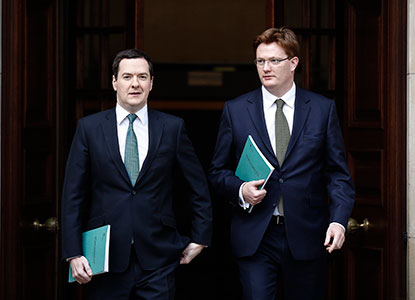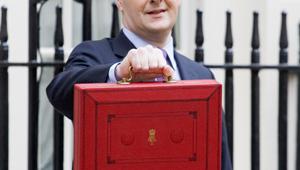By Richard Johnstone | 5 December 2013
Chancellor George Osborne has announced that the cap limiting the amount councils can borrow to build new homes will be increased by £300m, with the allocation to be distributed through local enterprise partnerships.

In his Autumn Statement, Osborne also confirmed the government would limit the increase in business rates – which are partly devolved to local authorities – to 2% next year, ahead of a full review of the system in 2017.
Councils have been calling for the cap on Housing Revenue Account borrowing to be lifted since it was introduced in April 2012, when authorities were made self-financing for council rents.
Osborne today said the £300m increase would build 10,000 new affordable homes across England.
The Autumn Statement document stated the increase would be split over two years, with £150m available in both 2015/16 and 2016/17.
But this allocation will form part of the competitive bidding process the government will run to split the £2bn ‘single pot' of Whitehall funding to England’s 39 LEPs.
Under the plan, councils will make proposals to build new homes using the borrowing facility as part of their LEP when bidding to agree a Local Growth Deal with the Treasury. Ministers will then allocate the funding based on a value-for-money assessment.
The Autumn Statement also revealed that controversial plans to top-slice £400m of the New Homes Bonus for the single pot would not now be imposed.
Local Government Association chair Sir Merrick Cockell said councils had consistently called for the Treasury to remove the housing borrowing cap.
‘The easing of restrictions on housing investment announced today does not go as far as we would like, but it does show that our call for more local flexibility to drive economic growth has been recognised,’ he said.
‘Our concerns about potentially costly changes to the New Homes Bonus have been taken on board in the revised proposals announced today. This is good news for local services which otherwise would have taken an additional £400m cut.’
CIPFA chief executive Rob Whiteman said the limited increase in the borrowing cap was 'massively disappointing'.
He added: 'CIPFA have long campaigned for the HRA borrowing cap to be lifted to allow local authorities to build the homes their communities need. It’s therefore massively disappointing to see it increased by only £150m next year, but also that this money comes with a host of strings attached with the government creating a complex competition before authorities can hope to see the benefits.
'If we are to tackle the housing challenge that our country faces we need to see the HRA borrowing cap lifted and new thinking from the government on house building.'
The LGA also urged the government to pay for the decision to cap business rates from the centrally-retained half of the tax and not pass the impact on to councils.
Treasury figures show that the decision to cap the annual increase in rates at 2% for 2014/15 – rather than the 3.2% expected – would cost £270m. Other business rate exemptions announced today, such as the extension of the relief programme for small business and a £1,000 discount for small shops, pubs and restaurants, cost £860m in total next year.
Sharon Taylor, the LGA’s finance panel chair, warned that passing these costs onto councils when the local government finance settlement was announced later this month would create more ‘financial instability’ in the sector.
At CIPFA, Whiteman said the government 'must explain' who is paying for the business rate reliefs. 'We need clarity from the government on who pays for this. Will it be local authorities whose services are already under enormous pressure and who already face on-going cuts to funding?'
Osborne also pledged to exempt councils from a further £1bn budget cut being placed on some Whitehall departments next year, so town halls will be able to freeze the council tax for a fourth year from April.
In the current financial year, central government departments are projected to underspend by £7bn, which the chancellor said allowed departmental budgets in both 2014/15 and 2015/16 to be reduced by £1bn.
As well as councils, Osborne said the ring-fenced areas of government spending in schools and hospitals would remain protected, while the security and intelligence agencies and Revenue & Customs would also be exempt.






















